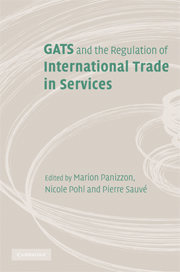Book contents
- Frontmatter
- Contents
- Contributors
- List of figures
- List of tables
- List of abbreviations
- Preface
- PART 1 Beyond regulatory control and multilateral flexibility: Gains from a cosmopolitan GATS
- PART 2 Unexplored economic, political and judicial dimensions of GATS
- 2 South–South services trade
- 3 The race towards preferential trade agreements in services: How much market access is really achieved?
- 4 Rules of origin in services: A case study of five ASEAN countries
- 5 Comment: Is services trade like or unlike manufacturing trade?
- PART 3 The limits of request–offer negotiations: Plurilateral and alternative approaches to services liberalisation
- PART 4 GATS case law: A first assessment
- PART 5 Market access, national treatment and domestic regulation
- PART 6 Unfinished business: Safeguard and subsidy disciplines for services
- PART 7 Challenges to the scope of GATS and cosmopolitan governance in services trade
- PART 8 Conclusion
- Index
- References
3 - The race towards preferential trade agreements in services: How much market access is really achieved?
from PART 2 - Unexplored economic, political and judicial dimensions of GATS
Published online by Cambridge University Press: 03 September 2009
- Frontmatter
- Contents
- Contributors
- List of figures
- List of tables
- List of abbreviations
- Preface
- PART 1 Beyond regulatory control and multilateral flexibility: Gains from a cosmopolitan GATS
- PART 2 Unexplored economic, political and judicial dimensions of GATS
- 2 South–South services trade
- 3 The race towards preferential trade agreements in services: How much market access is really achieved?
- 4 Rules of origin in services: A case study of five ASEAN countries
- 5 Comment: Is services trade like or unlike manufacturing trade?
- PART 3 The limits of request–offer negotiations: Plurilateral and alternative approaches to services liberalisation
- PART 4 GATS case law: A first assessment
- PART 5 Market access, national treatment and domestic regulation
- PART 6 Unfinished business: Safeguard and subsidy disciplines for services
- PART 7 Challenges to the scope of GATS and cosmopolitan governance in services trade
- PART 8 Conclusion
- Index
- References
Summary
Economists recognise that multilateral liberalisation is superior to preferential trade deals, which can distort trade and create costs, especially for non-parties. Despite the different characteristics of trade in goods and trade in services, the same basic conclusion applies. Nevertheless, the view that preferential agreements carry no or limited downsides is often expressed – even for those preferential agreements that are not part of a broader regional integration effort. It is sometimes pointed out that preferential liberalisation, especially as regards newer areas such as services, is better than no liberalisation at all and that the process of preferential liberalisation would largely ‘multilateralise’ itself: first, those not party to these preferential arrangements (especially with larger markets such as the US) would want to take part so as not be left behind; second, those countries having made reforms as part of preferential deals would find it easier to undertake liberalisation commitments at the WTO. Such views often find echo in the US, where the expression ‘competitive liberalisation’ has been coined to describe the recent turn of the US towards bilateral free trade agreements.
The number of preferential trade agreements (PTAs) signed by the US in the last few years, together with the number of countries that have engaged in PTA discussions with the US or expressed interest in doing so, suggest that the competition aspect seems at play.
- Type
- Chapter
- Information
- GATS and the Regulation of International Trade in ServicesWorld Trade Forum, pp. 77 - 110Publisher: Cambridge University PressPrint publication year: 2008
References
- 7
- Cited by



